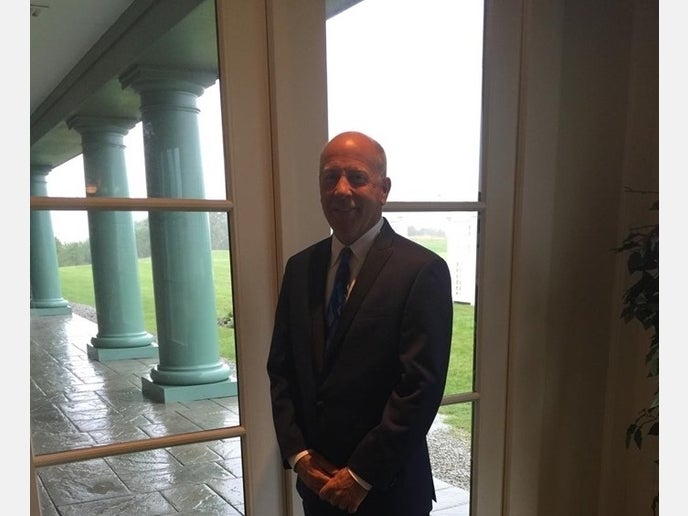By Lisa Finn.
CENTER MORICHES, NY — For Steve Scerri, who runs the Mount Pleasant Cemetery in Center Moriches, the new coronavirus has changed life in ways that are almost impossible to voice.
“It’s depressing, definitely,” Scerri said.
Scerri has done his job diligently for 37 years, but he hasn’t experienced something like the coronavirus, which has rocked the funeral industry. Things have been frantic as he struggles to keep up with an ever-mounting death toll not only in Suffolk County, which County Executive Steve Bellone called the “epicenter” of the coronavirus crisis nationwide, but in New York City, too.
Scerri is handling the cremations and burials of the dead from Manhattan to Montauk and all across Long Island, “because all the other crematoriums are backed up two weeks.”
“I’ve seen (a) 100 percent increase,” Scerri said of cremations and burials.
Before the coronavirus outbreak, Scerri was handling about 120 cremations and burials a month; now, that numbers hovers around 500. He’s working long days and nights to keep up with the endless march of death.
Extra precautions must be taken.
“Every person we get in, we treat as if they’ve had (the coronavirus), because we don’t know,” he said. “You don’t know for sure, and you’re not allowed to ask.”
His workers wear respirator masks, gloves and full-body suits. He said more personal protective equipment is desperately needed.
Even the funeral procedures have changed.
“We dig the hole, but when the hearse pulls up, we take the hearse to the grave and hold the cars back,” he said. “When my guys are gone, I let the cars pull forward. And then when they leave, my guys go back. No one is allowed around my help.”
That’s a painful reality.
“If they want help finding someone’s grave, we can’t help them,” he said. “If they have questions, we wave them by. You feel bad that you can’t help them — but if one person gets this, we all get it.”
The way people grieve is altered drastically.
“It’s terrible,” he said. “Families who want to see their loved ones, who want a chapel service before cremation, can’t have one. Hindus, who do a full cremation service, they can’t do that, either. This has got to be so painful, for all of them. They have no closure — nothing.”
The sheer number of deaths has caused tremendous issues in the funeral process, Scerri said. Add to that the mounting fear, with families afraid to claim the bodies of their loved ones or go talk to the funeral directors, who need paperwork filled out before they can get a burial permit. It’s caused morgues to be backed up for weeks. On Tuesday, Bellone said morgues countywide are at 70 percent capacity and a new refrigerated trailer was just purchased to allow for expanded morgue capacity.
Some families can’t come out to handle arrangements because they may be quarantined themselves, Scerri said.
Over the years, Scerri has worked with Ebola, which he said was far more dangerous than the coronavirus, but there are still many unknowns surrounding the virus, leading to anxiety, he said.
“It’s nerve-wracking,” he said. “The pressure is intense. We’re trying to get all this work done.”
“It’s very hard, to see what your husband is going through,” said his wife, Allyson Barone-Scerri. “Steve has been through 9/11, the TWA crash, where he was on the front lines and picked up the bodies — but nothing compares to this.”
When asked why the coronavirus is so different, Scerri said: “There’s no ending. This is going to go on. They’ve already told us to prepare for fall.”
And, Allyson said, “It’s the fear of the unknown.”
Standing on the front lines of death, Scerri has a message: “Stay home. It’s so simple. When you see kids think it’s not going to affect them, they don’t understand. If everyone had stayed home and listened, I don’t think we would be where we are today.”
Scerri said he also sympathizes with funeral home staff. “Those guys are shot. I feel badly for them,” he said, adding that he has put up a protective window to keep his staff protected.
Looking ahead, he said, “I don’t know if I can keep up with the numbers. It’s crazy.”
He thanked the New York State Division of Cemeteries for its unwavering support.
The coronavirus has left an indelible mark on hearts and souls, he said.
“It takes a toll on people working here,” he said. “It takes a toll on my people. On my secretary. These young guys, who’ve never been through a trauma. They don’t know how to wrap their heads around it.”
And death, under the cruel new constraints of the coronavirus, leaves a forever impact on families, he said. “They don’t know how to grieve. They didn’t have closure. They didn’t have any time. They’re just locked in their houses — just lost. It’s very sad.”
Her husband, Allyson said, is a “very giving kind of guy, a wonderful human.” He is also the vice president of New Beginnings, which helps individuals with disabilities, that she helms. Her husband, she said, is shouldering the heavy workload to make a time of great grief easier for the coroner’s office in New York City and for many across Long Island.
“He’s helping all of Long Island and New York City by taking his expertise and putting himself on the front lines,” she said. “He’s amazing, really.”
The virus, Scerri said, cuts across all demographics, as the cars keep coming in a steady stream all day, bringing the dead from New York and Long Island on their final journey.
“It’s affecting everyone — old, young and in between. I pray for all of them,” he said.
To donate to Mount Pleasant Cemetery, send donations to P.O. Box 81, Center Moriches, NY 11934. Personal protective equipment and funds to help the workers are needed, Scerri said.
For the full story by Lisa Finn, click here.



